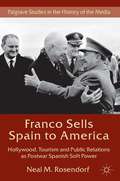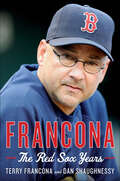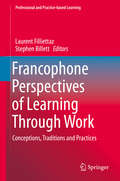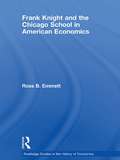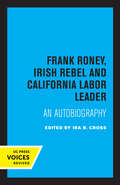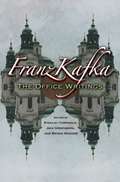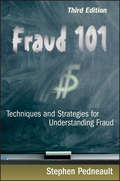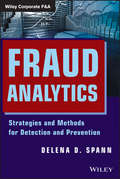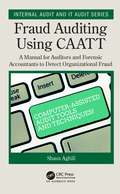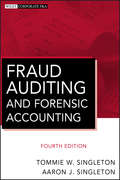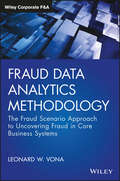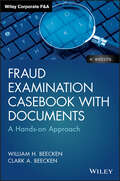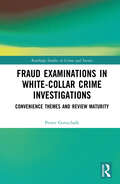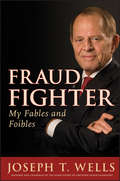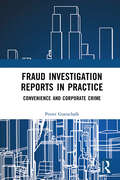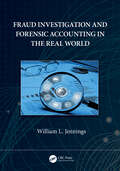- Table View
- List View
Franco Sells Spain to America
by Neal M. RosendorfA groundbreaking study of the Franco regime's utilization of Hollywood film production in Spain, American tourism, and sophisticated public relations programs - including the most popular national pavilion at the 1964-65 New York World's Fair - in a determined effort to remake the Spanish dictatorship's post-World War II reputation in the US.
Francona: The Red Sox Years
by Dan Shaughnessy Terry FranconaTHE NEW YORK TIMES BESTSELLER. “Eloquent and dazzling,” the story of the legendary baseball manager’s tenure with the Boston Red Sox (Philadelphia Daily News).When Terry Francona took over as manager of the Boston Red Sox in 2004, the storied franchise hadn’t won a World Series championship in eighty-six years. Led by Francona, the team won two over the course of four years. During the full eight years of Francona’s tenure, the Red Sox were transformed from “cursed” into one of the most successful and profitable teams in baseball history—only to fall back to last place as soon as Francona was gone.Francona: The Red SoxYears lets readers in on the inner workings of the Red Sox clubhouse like no book has ever done before. From the highs of the World Series to the lows of the final months of the 2011 season—the most epic collapse of a team in baseball history—this book features the never-before-told stories about Sox fans’ favorite players, moments, wins, and losses.“A scorched-earth memoir . . . [that] touches fleetingly on steroid use, sabermetrics, and Michael Jordan’s stint in the minor leagues . . . but saves its heaviest artillery for the owners . . . [and] Theo Epstein backs him up.” —The New York Times Book Review“It’s not often that baseball aficionados and gossip gluttons can plunk down on a shared portion of outfield grass with the same book for an afternoon of readerly delight, but Francona can bridge those kinds of differences.” —The Boston Globe
Francophone Perspectives of Learning Through Work
by Stephen Billett Laurent FilliettazThis book generates a comprehensive account of ways in which practice-based learning has been conceptualized in the Francophone context. Learning for occupations, and the educational and practice-based experiences supporting it are the subject of increased interest and attention globally. Governments, professional bodies, workplaces and workers are now looking for experiences that support the initial and ongoing development of occupational capacities. Consequently, more attention is being given to workplaces as sites for this learning. This focus on learning through work has long been emphasised in the Francophone world, which has developed distinct traditions and conceptions of associations between work and learning. These include ergonomics and professional didactics. Yet, whilst being accepted and of long standing in the Francophone world, these conceptions and traditions, and the practices supporting them are little known about or understood in the Anglophone world, which is the dominant medium for scientific and educational discussion. This book addresses this problem through drawing on accounts from France, Switzerland and Canada that make accessible and elaborate these traditions, conceptions and practices through examples of their applications to occupationally related learning. These accounts offer variations and culturally-specific developments of these traditions, but collectively emphasize a preoccupation with how both work and learning need to be understood through situated considerations of persons enacting their work practice. In this way, they offer noteworthy and worthwhile contributions to contemporary global considerations of learning through work.
Frank Addante, Serial Entrepreneur
by Noam Wasserman Antony UyFrank Addante is a 28-year-old serial entrepreneur who is in the process of building his fifth venture. Of his first four ventures, two were sold, one went public, and in the last he decided to close the venture and return unused capital to his investors. With the passing of each venture, he has learned about forming founding teams, splitting equity with his co-founders, hiring executives to work for him, and when to take outside funding. Now, he's facing pressure from investors who aren't happy with how he is building his current team and are questioning whether he should remain CEO.
Frank H. Knight
by David CowanThis book argues for the reconsideration of Frank Knight and the Chicago School of Economic thought in a post-Financial Crisis world. The author posits that the discussion of the founder of "Knightian Uncertainty" can reveal new insights into what the economy can do for society, as his prophetic insights can offer a view into the soul of the modern economy. The book first considers Frank Knight's early history and the unfolding of his economic philosophy before going on to evaluate his enduring legacy. All those interested in the influence of political and religious philosophy on economics will be delighted to discover the lasting impact of this great economic thinker.
Frank Knight and the Chicago School in American Economics (Routledge Studies in the History of Economics #Vol. 98)
by Ross B. EmmettOver the last twenty years, Ross B. Emmett has explored the work of Frank H. Knight, the philosopher of the Chicago School of economics. Knight occupies a paradoxical place in the history of Chicago economics: vital to the tradition’s teaching of price theory and the twentieth-century re-articulation of the defense of free enterprise and liberal democracy, yet a critic (in advance) of the empirical and methodological orientation that has characterized Chicago economics and the rest of the discipline in the post-war period, and skeptical of liberalism’s prospects. In the course of his investigation of Knight’s work, Emmett has written not only about Knight’s economics and philosophy, the nature of Chicago economics, and Knight’s place in the Chicago tradition, but also about the application of hermeneutic theory to the history of economics, the relation of the history of economic thought to the discipline of economics, and the relation between economics and religion. His eight-volume collection of primary-source material on The Chicago Tradition in Economics, 1892-1945 was published by Routledge in 2001.
Frank Mason (A)
by John J. Gabarro N. J. NormanRaises the following issues: understanding another person from his/her point of view, understanding how two people can view the same situation differently, and understanding how an individual's behavior can have secondary consequences of which he/she may not be aware.
Frank Mason (B)
by John J. Gabarro N. J. NormanSupplements the (A) case. Designed as an in-class handout.
Frank Roney, Irish Rebel and California Labor Leader: An Autobiography
by Ira B. CrossThis title is part of UC Press's Voices Revived program, which commemorates University of California Press’s mission to seek out and cultivate the brightest minds and give them voice, reach, and impact. Drawing on a backlist dating to 1893, Voices Revived makes high-quality, peer-reviewed scholarship accessible once again using print-on-demand technology. This title was originally published in 1931.
Franz Kafka: The Office Writings (Obras Selectas Ser.)
by Franz KafkaFranz Kafka: The Office Writings brings together, for the first time in English, Kafka's most interesting professional writings, composed during his years as a high-ranking lawyer with the largest Workmen's Accident Insurance Institute in the Czech Lands of the Austro-Hungarian Empire. Franz Kafka (1883-1924) is commonly recognized as the greatest German prose writer of the twentieth century. It is less well known that he had an established legal career. Kafka's briefs reveal him to be a canny bureaucrat, sharp litigator, and innovative thinker on the social, political, and legal issues of his time. His official preoccupations inspired many of the themes and strategies of the novels and stories he wrote at night.These documents include articles on workmen's compensation and workplace safety; appeals for the founding of a psychiatric hospital for shell-shocked veterans; and letters arguing relentlessly for a salary adequate to his merit. In adjudicating disputes, promoting legislative programs, and investigating workplace sites, Kafka's writings teem with details about the bureaucracy and technology of his day, such as spa elevators in Marienbad, the challenge of the automobile, and the perils of excavating in quarries while drunk. Beautifully translated, with valuable commentary by two of the world's leading Kafka scholars and one of America's most eminent civil rights lawyers, the documents cast rich light on the man and the writer and offer new insights to lovers of Kafka's novels and stories.
Frasier (A)
by Guhan Subramanian Michelle KalkaIn 2001, NBC entered into contract negotiations with Paramount Television Group to keep the hit show "Frasier" on the network. Paramount, the studio that produced the show, threatened to move "Frasier" to CBS, Paramount's sister network, if NBC did not agree to a substantially higher license fee than the one it was currently paying. This case follows Marc Graboff's (EVP of NBC West Coast) analysis of the situation.
Fraud 101
by Stephen PedneaultA straightforward guide explaining the nature of financial fraud Fraud continues to be one of the fastest growing and most costly crimes in the United States and around the world. The more an organization can learn about fraud in general and the potential fraud risks that threaten the financial stability of the organization's cash flow, the better that organization will be equipped to design and implement measures to prevent schemes from occurring in the first place. Fraud 101, Third Edition serves as an enlightening tool for you, whether you are a business owner or manager, an accountant, auditor or college student who needs to learn about the nature of fraud. In this invaluable guide, you will discover and better understand the inner workings of numerous financial schemes and internal controls to increase your awareness and possibly prevent fraud from destroying your organization's financial stability. It offers guidance, understanding, and new, real-world case studies on the major types of fraud, including An understanding of why fraud is committed An overview of financial fraud schemes White-collar crime Uncovering employee embezzlements Establishing internal fraud controls The nature of collecting evidence With case studies included throughout the book to gain insight to the real world of fraud, Fraud 101, Third Edition describes the features of fraud and then provides proven methods of prevention, as well as solutions to expose different types of fraud.
Fraud Analysis Techniques Using ACL
by David Coderre<P>Fraud Analysis Techniques Using ACL offers auditors and investigators: <P>Authoritative guidance from David Coderre, renowned expert on the use of computer-assisted audit tools and techniques in fraud detection <P>A website containing an educational version of ACL from the world leader in fraud detection software <P>An accompanying website containing a thorough Fraud Toolkit with two sets of customizable scripts to serve your specific audit needs <P>Case studies and sample data files that you can use to try out the tests <P>Step-by-step instructions on how to run the tests <P>A self-study course on ACL script development with exercises, data files, and suggested answers <P>The toolkit also contains 12 'utility scripts' and a self-study course on ACL scripting which includes exercises, data files, and proposed answers. <P>Filled with screen shots, flow charts, example data files, and descriptive commentary highlighting and explaining each step, as well as case studies offering real-world examples of how the scripts can be used to search for fraud, Fraud Analysis Techniques Using ACL is the only toolkit you will need to harness the power of ACL to spot fraud.
Fraud Analytics
by Delena D. SpannProven guidance for expertly using analytics in fraud examinations, financial analysis,auditing and fraud prevention Fraud Analytics thoroughly reveals the elements of analysis that are used in today'sfraudexaminations, fraud investigations, and financial crime investigations. This valuable resourcereviews the types of analysis that should be considered prior to beginning an investigation andexplains how to optimally use data mining techniques to detect fraud. Packed with examples andsample cases illustrating pertinent concepts in practice, this book also explores the two majordata analytics providers: ACL and IDEA. Looks at elements of analysis used in today's fraud examinations Reveals how to use data mining (fraud analytic) techniques to detect fraud Examines ACL and IDEA as indispensable tools for fraud detection Includes an abundance of sample cases and examples Written by Delena D Spann, Board of Regent (Emeritus) for the Association of CertifiedFraud Examiners (ACFE), who currently serves as Advisory Board Member of the Association ofCertified Fraud Examiners, Board Member of the Education Task Force of the Association ofCertified Anti-Money Laundering Specialists ASIS International (Economic Crime Council) andAdvisory Board Member of the Robert Morris University (School of Business), FraudAnalyticsequips you with authoritative fraud analysis techniques you can put to use right away.
Fraud Auditing Using CAATT: A Manual for Auditors and Forensic Accountants to Detect Organizational Fraud (Internal Audit and IT Audit)
by Shaun AghiliThis book discusses various common occupational and organizational fraud schemes, based on the Association of Certified Fraud Examiners (ACFE) fraud tree and assist fraud examiners and auditors in correctly choosing the appropriate audit tests to uncover such various fraud schemes. The book also includes information about audit test red flags to watch out for, a list of recommended controls to help prevent future fraud related incidents, as well as step-by-step demonstrations of a number of common audit tests using IDEA® as a CAATT tool.
Fraud Auditing and Forensic Accounting
by Tommie W. Singleton Aaron J. SingletonPraise for the Fourth Edition of Fraud Auditing and Forensic Accounting"Tommie and Aaron Singleton have made important updates to a book I personally rely very heavily upon: Fraud Auditing and Forensic Accounting (FAFA). In the newest edition, they take difficult topics and explain them in straightforward actionable language. All my students benefitted from reading the third edition of the FAFA to better understand the issues and area of fraud and forensic accounting. With their singular focus on understandability and practicality, this Fourth Edition of the book makes a very important contribution for academics, researchers, practitioners, and students. Bravo!"-Dr. Timothy A. Pearson, Director, Division of Accounting, West Virginia University, Executive Director, Institute for Fraud Prevention"Finally someone has written a book that combines fraud examination and forensic accounting. The authors have clearly explained both in their earlier edition and now they have enhanced the first with additional materials. The order in which the material is presented is easy to grasp and logically follows the 'typical' fraud examination from the awareness that something is wrong to the court case. The explanatory materials presented aid this effort by being both well placed within the book and relevant to the narrative." -Dr. Douglas E. Ziegenfuss, Chair and Professor, Department of Accounting, Old Dominion University"Fraud Auditing and Forensic Accounting is a masterful compilation of the concepts found in this field. The organization of the text with the incorporation of actual cases, facts, and figures provides a logical and comprehensive basis for learning the intricacies of fraud examination and forensic accounting. The authors successfully blend the necessary basics with advanced principles in a manner that makes the book an outstanding resource for students and professionals alike."-Ralph Q. Summerford, President of Forensic/Strategic Solutions, PC
Fraud Data Analytics Methodology: The Fraud Scenario Approach to Uncovering Fraud in Core Business Systems (Wiley Corporate F&A)
by Leonard W. VonaUncover hidden fraud and red flags using efficient data analytics Fraud Data Analytics Methodology addresses the need for clear, reliable fraud detection with a solid framework for a robust data analytic plan. By combining fraud risk assessment and fraud data analytics, you'll be able to better identify and respond to the risk of fraud in your audits. Proven techniques help you identify signs of fraud hidden deep within company databases, and strategic guidance demonstrates how to build data interrogation search routines into your fraud risk assessment to locate red flags and fraudulent transactions. These methodologies require no advanced software skills, and are easily implemented and integrated into any existing audit program. Professional standards now require all audits to include data analytics, and this informative guide shows you how to leverage this critical tool for recognizing fraud in today's core business systems. Fraud cannot be detected through audit unless the sample contains a fraudulent transaction. This book explores methodologies that allow you to locate transactions that should undergo audit testing. Locate hidden signs of fraud Build a holistic fraud data analytic plan Identify red flags that lead to fraudulent transactions Build efficient data interrogation into your audit plan Incorporating data analytics into your audit program is not about reinventing the wheel. A good auditor must make use of every tool available, and recent advances in analytics have made it accessible to everyone, at any level of IT proficiency. When the old methods are no longer sufficient, new tools are often the boost that brings exceptional results. Fraud Data Analytics Methodology gets you up to speed, with a brand new tool box for fraud detection.
Fraud Examination Casebook with Documents: A Hands-on Approach
by Clark A. Beecken William H. BeeckenA practical advantage for entry-level fraud examiners with start-to-finish casework Fraud Examination Casebook with Documents provides critical practice for students and new CPAs; criminal and insurance investigators; and attorneys seeking additional guidance on real-world fraud investigation. With five cases that include over 100 pages of documentation, this guide helps you put your conceptual knowledge to work as you conduct full-length Fraud Examinations from predication through report. Short instructional narratives guide you through tools like horizontal and vertical analysis, report writing, and other important tasks, while Excel templates streamline the process and kick start your investigation. Multiple-choice questions help you gauge your understanding and practical mastery, while expert guidance throughout prompts you to draw on your existing knowledge and apply it to casework. With a focus on asset misappropriation and financial statement fraud, these cases provide highly relevant experience for real-world practice. Learning concept isn't always enough to do the job effectively; "knowing" is different from "applying,” yet few practical resources exist for new and aspiring fraud examiners—until now. This book provides the much-needed practice that helps examiners polish their skills, with expert guidance every step of the way. Conduct actual Fraud Examinations Perform horizontal and vertical analyses Review checks and decode debit card transactions Examine adjustments to electronic records Perform simple forensic data analytics Vouch to/from documentation Write complete Fraud Examination reports Prepare court-ready schedules and audio-visuals As you work your way through the cases, you'll develop the skills and instinct experienced examiners rely upon every day. You'll hone your analytical edge and master the essentials of report writing, leaving you fully equipped to conduct a thorough investigation and deliver your findings clearly, comprehensively, and authoritatively. Fraud Examination Casebook with Documents is a vital resource for students and new fraud examiners seeking a practical advantage in real-world skills.
Fraud Examinations in White-Collar Crime Investigations: Convenience Themes and Review Maturity (Routledge Studies in Crime and Society)
by Petter GottschalkThis book reviews a range of reports written by fraud examiners after completing internal investigations. These reports are normally kept secret and are the property of client organizations, which do not wish to disclose potential wrongdoing that can harm the reputation of the businesses. Fraud Examinations in White-Collar Crime Investigations was able to retrieve several recent reports, including foreign aid kickbacks, Russian favors to the Biathlon president, and Leon Black’s deals with Jeffrey Epstein. While not claiming that the obtained reports are representative for the outcome of the private investigation industry, the reports do provide insights into the variety of issues that fraud examiners address in their internal investigations and the quality of their work. This book identifies convenience themes and assesses investigation maturity across the reports analyzed. It considers the motives of and opportunities for white-collar criminals, as well as their willingness to engage in unlawful activity, and assesses to what extent fraud examiners are either efficient or deficient in their work. A compelling read, this book will appeal to students and scholars of criminology, sociology, law, and politics, and all those interested in fraud examinations in relation to white-collar crime.
Fraud Fighter
by Joseph T. WellsA collection of insightful, poignant, and humorous stories from Dr. Joseph Wells, the world's foremost fraud expert?with gutsy revelations of his own past mistakes From his dysfunctional childhood in rural Oklahoma; his service in the U. S. Navy; a brief stint in public accounting followed by a career in the FBI; and founding the world's largest anti-fraud organization, Wells' colorful life experiences were preparation for his rise to one of the globe's most revered antifraud experts. Written by the preeminent antifraud authority and founder and Chairman of the ACFE Offers a fascinating behind-the-scenes look at the life of one of the most influential white-collar crime experts of our time At a period when dishonesty at top U. S. companies is dominating public attention, The Fables and Foibles of a Fraud Fighter is a surprisingly frank and gripping memoir from an unsurprisingly effective fraud fighter. This autobiography forms a full tapestry of a life, displaying wit, intrigue, trepidation, regret, and finally, ultimate victory.
Fraud Investigation Reports in Practice: Convenience and Corporate Crime
by Petter GottschalkInvestigation reports are written by fraud examiners after completion of internal reviews in client organizations when there was suspicion of financial wrongdoing. Fraud examiners are expected to answer questions regarding what happened, when it happened, how it happened, and why. This book presents a number of case studies of investigation reports by fraud examiners, offering a framework for studying the report as well as insights into convenience of fraud. The case studies, including KPMG and PwC, focus on two important subjects. First, convenience themes are identified for each case. Themes derive from the theory of convenience, where fraud is a result of financial motives, organizational opportunities, and personal willingness for deviant behaviors. Second, review maturity is identified for each case. Review maturity derives from a stages-of-growth model, where the investigation is assigned a level of maturity based on explicit criteria. The book provides useful insights towards approaching fraud examinations to enable better understanding of the rational explanations for corporate fraud. The book is framed from the perspective of private policing, which contextualizes how investigation reports are examined. This book is a valuable resource for scholars and upper-level students researching and studying auditing and investigation work in the corporate and public sectors. Business and management as well as criminal justice scholars and students will learn from the case studies how to frame a white-collar crime incident by application of convenience theory and how to evaluate a completed internal investigation by fraud examiners.
Fraud Investigation and Forensic Accounting in the Real World
by William L. JenningsThis book covers every aspect of forensic accounting, anti-fraud control systems, and fraud investigations. The author uses his own case experience to guide the reader through each phase of a forensic accounting assignment and fraud investigation. The book opens with an explanation of what happened to a company that was ensnared in a huge commodity purchasing scheme. Using his knowledge and experience gained over 40 years, the author illustrates that unexpected fraud occurrences can happen to any company, in any industry. Additionally, the author explains the current white-collar crime threats that organizations face every day, as well as legal issues that are often implicated in forensic accounting and fraud investigation projects. Electronic and non-electronic evidence gathering is also covered in detail with illustrative examples. One chapter is devoted entirely to the often misunderstood, but extremely important, subject of witness interviews. It provides the correct approach to the analysis and correlation of evidence in determining findings and conclusions of an investigation. Another chapter is devoted to proper report writing. The author provides detailed guidance on presenting findings to a variety of audiences, including management, a board, law enforcement, and at trials and hearings. It also covers proper techniques for measuring economic damages and concludes with a useful index. William L. Jennings is a Senior Director at Delta Consulting Group. He is responsible for providing forensic accounting, investigation, and asset recovery services to corporations, government agencies, attorneys, and their clients, as well as business controls consulting services to organizations. With more than 40 years of experience in public accounting and auditing, forensic accounting, business valuation, investigation, asset recovery, and business controls development, Mr. Jennings has worked on hundreds of forensic accounting and investigation assignments and he provides expert testimony.
